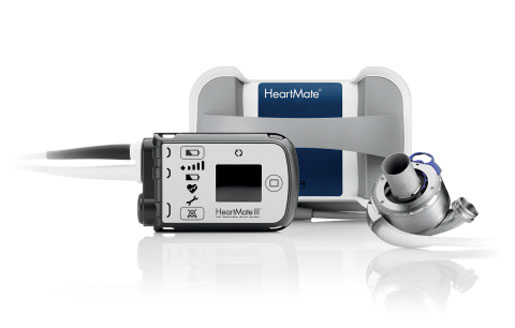HeartWare Expects Market Share Losses in LVAD Rivalry
HeartWare expects more market share to flow to competitor St. Jude Medical. What market dynamics are thought to be behind this shift?
February 26, 2016

HeartWare expects more market share to flow to competitor St. Jude Medical. What market dynamics are thought to be behind this shift?
Marie Thibault
The HeartMate 3 from St. Jude Medical is causing a shift in LVAD market share and putting competitive strain on HeartWare.
HeartWare, one of the two major makers of left ventricular assist devices (LVADs), is expecting market share challenges this year due to competitive pressure.
Competitor St. Jude Medical, which bought LVAD maker Thoratec last year, sells the HeartMate II and HeartMate III devices. HeartWare expects market share shifts because of St. Jude Medical's HeartMate 3, which received CE Mark in October and is also being studied in a trial of more than 1000 patients in the United States. LVADs are used in patients with severe heart failure.
Management pointed to evidence of HeartMate 3's impact already in the fourth quarter of 2015. The company's international sales were down 4% in constant currency and approximately flat in the United States versus the year ago quarter. "This reflected the anticipated effect of early HeartMate 3 sales as well as sustained foreign currency headwinds," said Peter McAree, HeartWare's senior vice president, chief financial officer, and treasurer, according to a Seeking Alpha transcript of the earnings call.
McAree elaborated on the issue, according to the call transcript:
As we look to our performance in 2016, we are expecting significant top-line pressure which is not easily quantifiable. The largest impact is likely to be observed internationally where sites have begun to implant HeartMate 3. Given market feedback on the early performance of HeartMate 3 compared to HeartMate II, it stands to reason that many of our international customers including some of our largest customers, will allocate a fair proportion of their share to HeartMate 3. The unfortunate impact of any share rebalancing among larger sites where we've enjoyed a significant share advantage, is that it will be very difficult to make up for those share losses through new site additions or increase volume at smaller centers."
The impact of this may mean a large market share loss for HeartWare outside the United States. This could lead to "a double-digit share shift internationally over the course of 2016, although our team is determined to battle hard against this possibility," McAree said.
On its latest earnings call, St. Jude Medical's management team said they were happy with the HeartMate 3 OUS launch.
HeartWare has historically experienced high market shares in large international centers and the shift appears to be administrative rather than due to a new sales strategy, management said. According to the call transcript, president and CEO Doug Godshall emphasized the company's challenge of making up for the volume if these busy sites decide to shift more share toward HeartMate 3. He said, ". . . sites that initially have very little interest, frankly, in even trialing the HeartMate 3 or at best trialing it are now shifting to a much more balanced share of HVAD and HeartMate 3 really rather roughly, even some of them before they've tried more than one device. And this seems to be driven, particularly at some of the larger centers by a strong bias toward having sort of a fair share concept. We've enjoyed a fairly unfair share in their mind with 75%, 80%, greater than 80% share in some of these larger centers."
In the United States, HeartWare's current generation HVAD has been approved for use as a bridge to heart transplant (BTT), but does not yet have a destination therapy (DT) indication for use in patients who are not expected to receive a transplant but will live the rest of their lives with an LVAD. While HeartWare has completed a DT trial with the HVAD and plans to file with FDA in mid-2016 in anticipation of a potential DT approval by mid-2017, it may be hurt meanwhile by the U.S. HeartMate 3 trial and the lack of domestic DT HVAD implants unless a continued access protocol is granted allowing additional procedures.
HeartWare is refocusing on its current generation HVAD, as its next-gen MVAD is stalled in testing to determine potential causes of pump thrombus. Godshall said on the call that because software algorithms are expected and it is not yet clear whether changes to the MVAD pump design will be necessary, any submission to resume MVAD trial implants is quarters away.
Management detailed a number of improvements planned for the HVAD, including surgical instruments to be used with the thoracotomy approach, the addition of a pulsatility algorithm which may allow for more regular aortic valve function, a battery upgrade, and a new version of the controller.
Marie Thibault is the associate editor at MD+DI. Reach her at [email protected] and on Twitter @medtechmarie.
[Image courtesy of ST. JUDE MEDICAL, INC.]
About the Author(s)
You May Also Like


